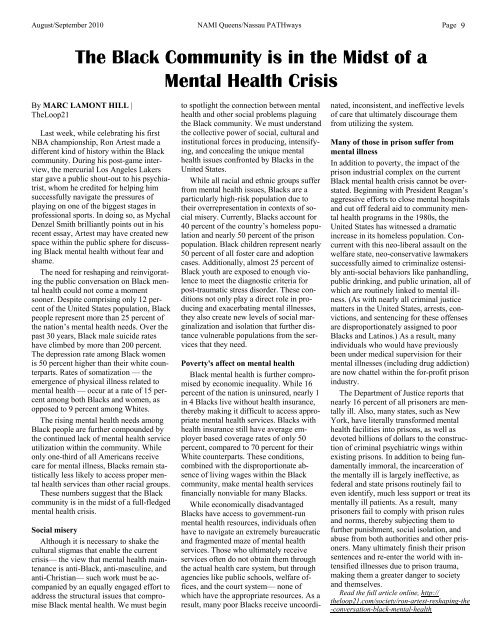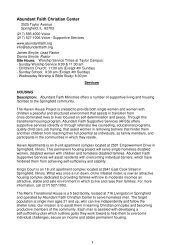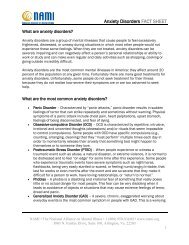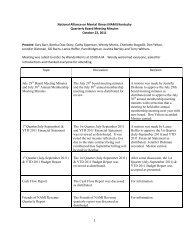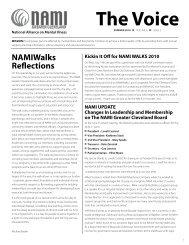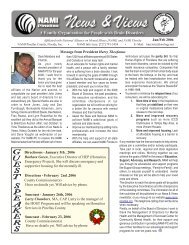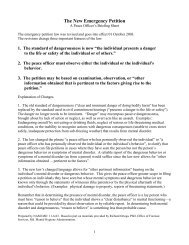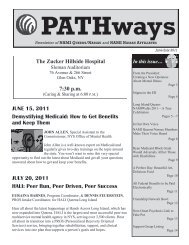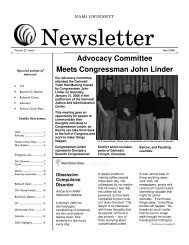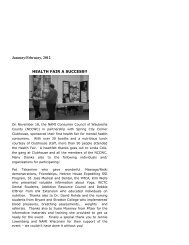PATHways Newsletter.pub - NAMI
PATHways Newsletter.pub - NAMI
PATHways Newsletter.pub - NAMI
You also want an ePaper? Increase the reach of your titles
YUMPU automatically turns print PDFs into web optimized ePapers that Google loves.
August/September 2010 <strong>NAMI</strong> Queens/Nassau <strong>PATHways</strong> Page 9<br />
The Black Community is in the Midst of a<br />
Mental Health Crisis<br />
By MARC LAMONT HILL |<br />
TheLoop21<br />
Last week, while celebrating his first<br />
NBA championship, Ron Artest made a<br />
different kind of history within the Black<br />
community. During his post-game interview,<br />
the mercurial Los Angeles Lakers<br />
star gave a <strong>pub</strong>lic shout-out to his psychiatrist,<br />
whom he credited for helping him<br />
successfully navigate the pressures of<br />
playing on one of the biggest stages in<br />
professional sports. In doing so, as Mychal<br />
Denzel Smith brilliantly points out in his<br />
recent essay, Artest may have created new<br />
space within the <strong>pub</strong>lic sphere for discussing<br />
Black mental health without fear and<br />
shame.<br />
The need for reshaping and reinvigorating<br />
the <strong>pub</strong>lic conversation on Black mental<br />
health could not come a moment<br />
sooner. Despite comprising only 12 percent<br />
of the United States population, Black<br />
people represent more than 25 percent of<br />
the nation’s mental health needs. Over the<br />
past 30 years, Black male suicide rates<br />
have climbed by more than 200 percent.<br />
The depression rate among Black women<br />
is 50 percent higher than their white counterparts.<br />
Rates of somatization — the<br />
emergence of physical illness related to<br />
mental health — occur at a rate of 15 percent<br />
among both Blacks and women, as<br />
opposed to 9 percent among Whites.<br />
The rising mental health needs among<br />
Black people are further compounded by<br />
the continued lack of mental health service<br />
utilization within the community. While<br />
only one-third of all Americans receive<br />
care for mental illness, Blacks remain statistically<br />
less likely to access proper mental<br />
health services than other racial groups.<br />
These numbers suggest that the Black<br />
community is in the midst of a full-fledged<br />
mental health crisis.<br />
Social misery<br />
Although it is necessary to shake the<br />
cultural stigmas that enable the current<br />
crisis— the view that mental health maintenance<br />
is anti-Black, anti-masculine, and<br />
anti-Christian— such work must be accompanied<br />
by an equally engaged effort to<br />
address the structural issues that compromise<br />
Black mental health. We must begin<br />
to spotlight the connection between mental<br />
health and other social problems plaguing<br />
the Black community. We must understand<br />
the collective power of social, cultural and<br />
institutional forces in producing, intensifying,<br />
and concealing the unique mental<br />
health issues confronted by Blacks in the<br />
United States.<br />
While all racial and ethnic groups suffer<br />
from mental health issues, Blacks are a<br />
particularly high-risk population due to<br />
their overrepresentation in contexts of social<br />
misery. Currently, Blacks account for<br />
40 percent of the country’s homeless population<br />
and nearly 50 percent of the prison<br />
population. Black children represent nearly<br />
50 percent of all foster care and adoption<br />
cases. Additionally, almost 25 percent of<br />
Black youth are exposed to enough violence<br />
to meet the diagnostic criteria for<br />
post-traumatic stress disorder. These conditions<br />
not only play a direct role in producing<br />
and exacerbating mental illnesses,<br />
they also create new levels of social marginalization<br />
and isolation that further distance<br />
vulnerable populations from the services<br />
that they need.<br />
Poverty's affect on mental health<br />
Black mental health is further compromised<br />
by economic inequality. While 16<br />
percent of the nation is uninsured, nearly 1<br />
in 4 Blacks live without health insurance,<br />
thereby making it difficult to access appropriate<br />
mental health services. Blacks with<br />
health insurance still have average employer<br />
based coverage rates of only 50<br />
percent, compared to 70 percent for their<br />
White counterparts. These conditions,<br />
combined with the disproportionate absence<br />
of living wages within the Black<br />
community, make mental health services<br />
financially nonviable for many Blacks.<br />
While economically disadvantaged<br />
Blacks have access to government-run<br />
mental health resources, individuals often<br />
have to navigate an extremely bureaucratic<br />
and fragmented maze of mental health<br />
services. Those who ultimately receive<br />
services often do not obtain them through<br />
the actual health care system, but through<br />
agencies like <strong>pub</strong>lic schools, welfare offices,<br />
and the court system— none of<br />
which have the appropriate resources. As a<br />
result, many poor Blacks receive uncoordi-<br />
nated, inconsistent, and ineffective levels<br />
of care that ultimately discourage them<br />
from utilizing the system.<br />
Many of those in prison suffer from<br />
mental illness<br />
In addition to poverty, the impact of the<br />
prison industrial complex on the current<br />
Black mental health crisis cannot be overstated.<br />
Beginning with President Reagan’s<br />
aggressive efforts to close mental hospitals<br />
and cut off federal aid to community mental<br />
health programs in the 1980s, the<br />
United States has witnessed a dramatic<br />
increase in its homeless population. Concurrent<br />
with this neo-liberal assault on the<br />
welfare state, neo-conservative lawmakers<br />
successfully aimed to criminalize ostensibly<br />
anti-social behaviors like panhandling,<br />
<strong>pub</strong>lic drinking, and <strong>pub</strong>lic urination, all of<br />
which are routinely linked to mental illness.<br />
(As with nearly all criminal justice<br />
matters in the United States, arrests, convictions,<br />
and sentencing for these offenses<br />
are disproportionately assigned to poor<br />
Blacks and Latinos.) As a result, many<br />
individuals who would have previously<br />
been under medical supervision for their<br />
mental illnesses (including drug addiction)<br />
are now chattel within the for-profit prison<br />
industry.<br />
The Department of Justice reports that<br />
nearly 16 percent of all prisoners are mentally<br />
ill. Also, many states, such as New<br />
York, have literally transformed mental<br />
health facilities into prisons, as well as<br />
devoted billions of dollars to the construction<br />
of criminal psychiatric wings within<br />
existing prisons. In addition to being fundamentally<br />
immoral, the incarceration of<br />
the mentally ill is largely ineffective, as<br />
federal and state prisons routinely fail to<br />
even identify, much less support or treat its<br />
mentally ill patients. As a result, many<br />
prisoners fail to comply with prison rules<br />
and norms, thereby subjecting them to<br />
further punishment, social isolation, and<br />
abuse from both authorities and other prisoners.<br />
Many ultimately finish their prison<br />
sentences and re-enter the world with intensified<br />
illnesses due to prison trauma,<br />
making them a greater danger to society<br />
and themselves.<br />
Read the full article online, http://<br />
theloop21.com/society/ron-artest-reshaping-the<br />
-conversation-black-mental-health


